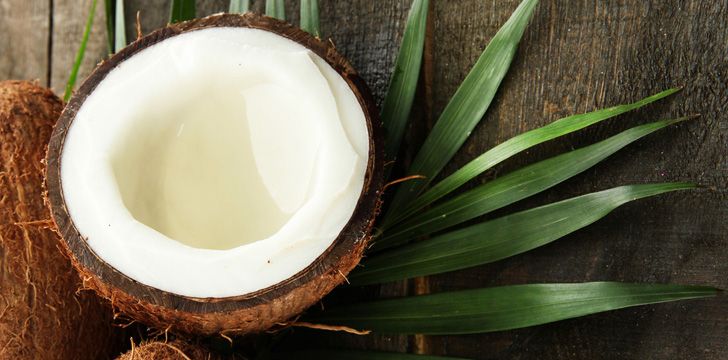
World Coconut Day: World Coconut Day is observed on 2 September 2020 with an to create awareness about the importance of the coconut across the world. World Coconut Day is celebrated by the Asian and Pacific Coconut Community (APCC) and its member states every year. Get more information about the History of World Coconut Day, APCC, Health benefits of Coconut from this article.
World Coconut Day 2020

World Coconut Day is observed on 2nd September every year by the Asian and Pacific Coconut Community (APCC). World Coconut Day 2020 aims to encourage investments and promote the development of the coconut industry in the member countries of APCC. The World Coconut Day is celebrated to make the people understand that Coconut has a vital role in poverty reduction.

What is the History of World Coconut Day?

World Coconut Day was established in the year 2009. The day is observed to commemorate the formation day of APCC which functions under the aegis of the United Nations Economic and Social Commission for Asia and the Pacific (UN-ESCAP). World Coconut Day is observed to highlight the importance and uses of coconuts. World Coconut Day is an occasion to interpret policies and express the plan of action in this sector.
APCC is an inter-governmental organization that consists of 18 member countries that are mandated to promote, coordinate, and harmonize coconut developmental activities of the Asian Pacific region. Several major coconut-growing countries, including India, are members of the APCC. It is headquartered in Jakarta, Indonesia.
APCC
Type: Inter-governmental organization
Headquarters: Jakarta, Indonesia
Membership: 18 countries
Coconut

Coconut belongs to Arecaceae, the palm tree family. Coconut is the only living species of the genus Cocos. It is a mature fruit of the Cocos nucifera palm. It is an indispensable food item for the people of South and South-East Asia and the Pacific islands. The Coco palm grows well in tropical climates as it requires moist, sandy, well-drained soil. It flourishes well in the saline-rich coastal regions. The Palm Coconut can reach more than 100 feet in height. The life span of Palm Coconut is about about 75 to 100 years.
Initially, after planting, it takes 4-5 years to begin their first produce. A single coconut palm has the ability to yield 20-150 mature nuts in a year. The outer husk is light green. As the nut matures, it becomes dry and turns gray. The husk or the exocarp is about 1-2 inches in thickness and made of tough fibers. Underneath the husk, kernel-endosperm, a woody shell enclosing inner edible meat, is present. The harvested mature coconut fruit contains some amount of sweet water inside its central hollow cavity surrounded by the white meat,. the endosperm. The fruit with its shell, kernel (meat), and water together constitute a Coconut.
What are the health benefits of Coconut?
/coconut_annotated-9c406299833d4ce0a416516e24b8ebc1.jpg)
Cocunt is a complete food rich in vitamins, calories, and minerals. The various health benefits of Coconuts are listed below:
A coconut carrying 400 g edible meat and around 30-150 ml of water holds all the daily-required essential including minerals, vitamins, and energy of an average-sized individual.
The 100 g kernel holds 354 calories.
The meat of the coconut is disproportionately high in saturated fats when compared to other common edible nuts.
The lauric acid, a saturated fatty acid in the coconut, increases good-high-density lipoprotein (HDL) cholesterol levels in the blood. It is also good for coronary arteries by preventing vessel blockage.
Coconut water contains simple sugar, electrolytes, minerals, and bioactive compounds like cytokinin, and enzymes such as polymerases, acid phosphatase, catalase, dehydrogenase, peroxidase, etc. The enzymes help in metabolism and digestion.
Coconut oil is commonly extracted from Copra or dry kernel. The oil is an excellent emollient agent. It can be used used in cooking, applied over the scalp as hair nourishment, employed in pharmacy and medicines.
Coconut kernel is an excellent source of minerals such as copper, calcium, iron, manganese, magnesium, and zinc.
Coconut is a source of B-complex vitamins such as riboflavin, folates, niacin, thiamin, and pyridoxine.
How to Celebrate World Coconut Day

World Coconut Day is celebrated by raising awareness about the health and commercial benefits of Coconut. Celebrated Coconut that was planted in tropical regions for millions of years. On this day, the entire world celebrates one of nature’s healthiest foods. In India, Coconut Development Board celebrates World Coconut Day.
- On this day, crack open a coconut, if you have never done it. It will be a lot of fun to crack into a real coconut.
- Cook special coconut-based food and serve it to your loved ones.
- You can also throw a party, and provide coconut based dishes and drinks.
- Post and share your World Coconut Day celebrations on social media using the hashtag #WorldCoconutDay.
Coconut – Interesting Facts

Coconut is be used as a flotation device.
In Asian and Pacific Ocean cultures the coconut figures in creation stories and myths.
Coconut trees can’t be grown away from the shore without human beings transporting it.
Other than India, ancient coconut fossils have been found in Australia and Columbia.
It is said that the coconut fruit can travel up to 100 days on the ocean’s tide and still germinate.
Over 100 species of coconut trees are present. It includes dwarf varieties.
Coconut used to be spelled “cocoanut.”
In the Maldives, Coconut is in the nation’s coat of arms and is the national tree.
Coconut is used in religious ceremonies in India. It is prominent in the Hindu religion.
The coconut tree contains both male and female flowers but doesn’t self-pollinate.
The tree has an unusually shallow, fibrous root system that lacks a tap root and root hairs.
The trunk of a coconut tree is used in the construction of bridges, houses, and boats.
In the 1970s, General Marcos of the Philippines built a palace from coconut timber.
Sap from the unopened coconut flower can be made into “coconut vodka.”
Coconut Day – Wishes

May the God of the sea give all the happiness to you and your family. Let’s celebrate this healthy festival of coconut day.
On this coconut-y occasion, I wish you a bright, happy, and world coconut day.
Let us spread love & happiness on this precious day of world coconut day.
Special Wishes to you and your family on World Coconut Day. Let us offer prayers to God of the sea to bless every people on earth.
Let’s spread kindness and love all around to keep a healthy environment around us. – Happy World Coconut Day!
World Coconut Day – FAQ
1. When is the National Coconut Day celebrated?
National Coconut Day is celebrated on 26 June every year. National Coconut Day is celebrated to create awareness about the benefits of coconut.
2. When was the Coconut Development Board (CDB) established?
Coconut Development Board (CDB) was established on 12 January 1981. It is a statutory body established under the Ministry of Agriculture of the Government of India for the integrated development of coconut and coconut-related products.
3. What is the theme of the 2019 World Coconut Day?
The theme of 2019 World Coconut Day is ‘Coconut for Family Wellness’. The theme aimed to promote, coordinate, and harmonize coconut developmental activities of the Asian Pacific region.
WHY WE LOVE WORLD COCONUT DAY

- There are so many ways to enjoy coconuts Odds are that you have recently experienced coconut, in some form or another. If you haven’t had a smoothie or a cocktail or an entree made with coconut milk, coconut cream, coconut water, coconut oil, or the fruit itself, you may have washed your face, shampooed your hair, moisturized, or exfoliated with a coconut by-product. Coconut shells can be used as bowls, to make buttons, and to create the sound effect of horses’ hooves.
- Coconuts are delicious Coconut products add a scrumptious creaminess to any drink or dish. A smoothie takes on a tropical flair, while even the simplest curry gets depth from coconut milk. Raw coconut makes a perfect snack, and lends just the right amount of chewiness to baked goods. And unless your coconut has added sugar, it will work well in savory applications as well as sweet ones.
- You guessed it — coconuts are nutritious. Is coconut the new kale? Well, probably not, but coconuts are high in iron, magnesium, fiber and protein. Coconut water provides potassium and sodium. In moderate amounts, coconut oil — a medium-chain fatty acid — is not harmful, although the jury is out on whether or not it’s helpful. And coconut products play prominent roles in gluten-free, soy-free, and vegan diets.



